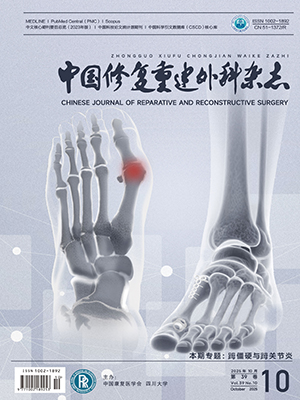Objective To study the immunological rejection occurred in different period after the in vivo implantation of vitreous-cryopreservation tissue engineered tendons for the repair of tendon defect and investigate its influences on the hepatic, renal, and cardiovascular function of rats. Methods Tenocytes obtained from tail tendon of one-weekold SD rats were cultured in vitro. The tenocytes at passage 2-4 (5 × 106 cells/mL) were co-cultured with 1.5 cm bio-derived tendon material to reconstruct tissue engineered tendon. The 21% DMSO was used as cryopreservation protection solution and
the Eurocoll ins solution served as basic solution for pre-frozen solution (4 ) and eluent. The cell-scaffold composites were vitreous-cryopreserved by self-designed method. Seventy-two healthy SD rats (male and/or female) weighing 210-230 g were randomly divided into three groups: group A (n=32), group B (n=32), and group C (n=8). The 0.5 cm tendon defect model was establ ished in the middle part of Achilles tendon in groups A and B. The defect in group A and B was repaired by the transplantation of tissue engineered tendon with and without vitreous-cryopreservation, respectively. At 2, 4, 6, and 8 weeks after transplantation, the general observation and the detection of hepatic function, renal function, and cardiovascular function were conducted. At 2, 4, and 6 weeks after transplantation, serum immunology test was conducted. Results There were no tissue necrosis, hydrops, and suppurative infection in groups A and B. The adhesion was evident in groups A and B 2 weeks after transplantation, improved gradually during 4-6 weeks, and disappeared at 8 weeks. The neonatal tissue had full integration and continuity, and the bridging region of the tendon healed and was similar to the normal tendon. For serum IgG and IgM content, there was no significant difference when group A or B was compared with group C, and between group A and group B 2, 4, and 6 weeks after transplantation (P gt; 0.05). Hepatic function: aspartate aminotransferase (AST) content of group A was less than that of group C 4 weeks after transplantation (P lt; 0.05); AST content of group B was less than that of group C 4 and 6 weeks after transplantation (P lt; 0.05); but there was no significant difference when group A or B was compared with group C in terms of other indexes 8 weeks after transplantation (P gt; 0.05). Renal function: serum albumin and creatinine in groups A and B were decreased obviously, and significant difference was evident when compared with group C (P lt; 0.05). Cardiovascular function: there was no significant difference between group A and group C in terms of blood glucose, triglyceride, and cholesterol (P gt; 0.05);
there was a significant difference between group B and group C in terms of triglyceride 8 weeks after transplantation (P lt; 0.05). Conclusion Repairing tendon defect with the implantation of vitreous-cryopreservation tissue engineered tendons results in no obvious immunological rejection and exerts no obvious influences on hepatic, renal, and cardiovascular function.
Citation: LIAO Meixu,LIU Chengjun,ZHU Minghua,QIN Tingwu. EFFECT OF VITREOUS-CRYOPRESERVATION ON IN VIVO IMPLANTATION OF TISSUE ENGINEERED TENDONS. Chinese Journal of Reparative and Reconstructive Surgery, 2009, 23(10): 1229-1234. doi: Copy
Copyright © the editorial department of Chinese Journal of Reparative and Reconstructive Surgery of West China Medical Publisher. All rights reserved




